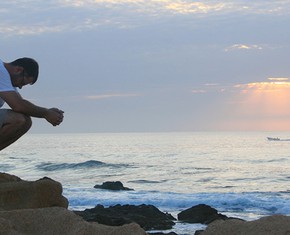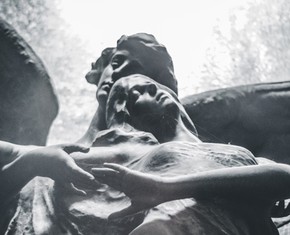The views expressed in our content reflect individual perspectives and do not represent the authoritative views of the Baha'i Faith.
This quote from the Baha’i writings has always perplexed me–and worried me a bit, to be honest:
How often hath a sinner, at the hour of death, attained to the essence of faith, and, quaffing the immortal draught, hath taken his flight unto the celestial Concourse. And how often hath a devout believer, at the hour of his soul’s ascension, been so changed as to fall into the nethermost fire. – Baha’u’llah, The Book of Certitude, p. 194.
So, I’ve asked myself, is it really only these last moments of our lives that will count? More troubling, will a whole life of good works not matter or, alternatively, will a life of sin not do that much damage to one’s soul? We all have our dishonest days, but, as one who has usually tried to “do the right thing,” this final judgment hardly seems fair.
Instead of trying to follow the laws and values of a religious and spiritual life, perhaps I should have been out satisfying “my lusts and corrupt inclinations” as the Baha’i writings refer to them.
If I read between the lines of the above passage, however, it also says to me that only God can know the hearts of His servants. One’s public face can be anything, but only we–and our Maker–know if we are living a lie and not developing our true selves. Perhaps, the main message then is that we should care far less about what other people think of us, and far more about whether our behavior is pleasing to God. Another prayer from the Bab reflects this theme:
For if it [my soul] departeth while Thou art pleased with me, then I shall be free from every concern or anxiety; but if it abandoneth me while Thou art displeased with me, then, even had I wrought every good deed, none would be of any avail, and had I earned every honor and glory, none would serve to exalt me. – Selections from the Writings of the Bab, pp. 187-188.
Despite the importance of our last words and testaments vis-à-vis our relationship with God, other texts in the Baha’i writings make it fairly clear that we don’t necessarily get away with evil acts in the meantime, as a passage from Baha’u’llah reiterates:
Think not that which ye have committed hath been effaced in My sight. By My beauty! All your doings hath My pen graven with open characters upon tablets of chrysolite. – Baha’u’llah, The Hidden Words, p. 44.
When I was young, I recall my father reminding me now and then about those “tablets of chrysolite,” which probably made me think a little more seriously about the ramifications of my behavior, both good and bad!
In a more serious vein, most religious scriptures point to a final reckoning of some sort. Religions such as the Baha’i Faith, Christianity, Islam–and even many pagan belief systems–refer to the continuation of the soul in another world. Faith traditions like Hinduism and Buddhism center on reincarnation. In all cases, though, the status in the afterlife is a reflection of our conduct in this one. There’s that whole karma thing, for example.
In the end though, it would seem that God decides. He can be merciful or just. I expect that most people hope for the former. But there appears to be a winnowing process, too:
… God proveth His servants and sifteth them, separating the believer from the infidel, the detached from the worldly, the pious from the profligate, the doer of good from the worker of iniquity, and so forth. Thus hath the Dove of holiness proclaimed: ’Do men think when they say ’We believe’ they shall be let alone and not be put to proof?’ – Baha’u’llah, Gems of Divine Mysteries, p. 25.
In another passage, Baha’u’llah adds a hopeful perspective:
Know thou, of a truth, that if the soul of man hath walked in the ways of God, it will, assuredly, return and be gathered to the glory of the Beloved. – Gleanings from the Writings of Baha’u’llah, p. 161.
The idea of going back to our source, and the true love we all long for, has a lot of appeal. But, it’s hard to say what the process of getting there looks like. We may have more judgments on ourselves then God has of us, for example. Other authors at BahaiTeachings.org have examined this theme in more detail, with a focus on the fascinating stories of those who have had near death experiences, or NDE’s. Most of these individuals report seeing a review of every moment of their lives, and experiencing both the love and harm they have brought to others. (That’s not a film I am particularly eager to see. Maybe I can just ask to watch Netflix?!)
Ultimately, I don’t think most of us really know what condition our souls may be in when we leave this earthly plane—but thinking more often about the afterlife may well make us better people in this life.
















Comments
Sign in or create an account
Continue with Googleor